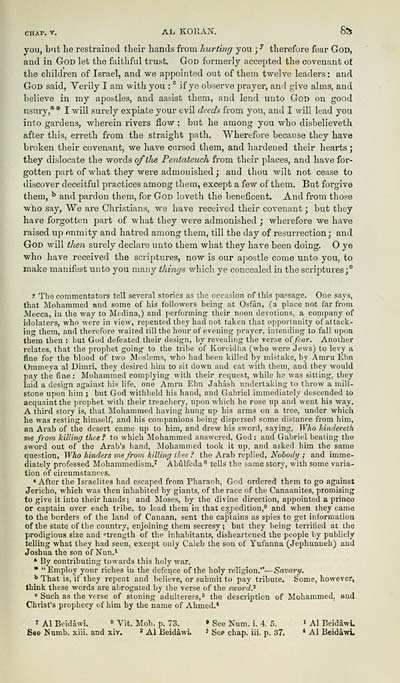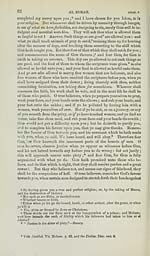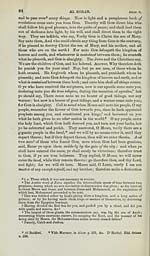Download files
Complete book:
Individual page:
Thumbnail gallery: Grid view | List view

you, but he restrained their hands from hurting you ; ^ therefore fear God,
and in GoD let the faithful trust. God formerly accepted the covenant ot
the children of Israel, and we appointed out of them twelve leaders: and
God said, "Verily I am with you : ^ if ye observe prayer, and give alms, and
believe in my apostles, and assist them, and lend unto God on good
usury,"* I will surely expiate your evil deeds from you, and I will lead you
into gardens, wherein rivers flow : but he among you who disbelieveth
after this, erreth from the straight path. Wherefore because they have
broken their covenant, we have cursed them, and hardened their hearts ;
they dislocate the words of the Pentateuch from their places, and have for-
gotten part of what they wei'e admonished j and thou wilt not cease to
discover deceitful practices among them, except a few of them. But forgive
them, ^ and pardon them, for God loveth the beneficent. And from those
who say. We are Christians, we have received their covenant ; but they
hare forgotten part of what they were admonished ; wherefore we have
raised up nnmity and hatred among them, till the day of resurrection; and
God will then surely declare unto them what they have been doing. ye
who have received the scriptures, now is our apostle come unto you, to
make manifest unto you many things which ye concealed in the scriptures;*'
y The oommentators tell several stories as the occasion of this passage. One says,
that Mohammed and some of his followers being at Osfan, (a place not far from
Mecca, iu the way to Medina,) and performing their noon devotions, a company of
idolaters, who were in view, repented they had not taken that opportunity of attack-
ing them, and therefore waited till the hour of evening prayer, intending to fall upon
them then : but God defeated their design, by revealing the verse oi fear. Another
relates, that the prophet going to the tribe of Koreidha (who were Jews) to levy a
fine for the blood of two Moslems, who had been killed by mistake, by Amru Ebn
Ummeya al Dimri, they desired him to sit down and eat with them, and they would
pay the fine : Mohammed complying with their request, while he was sitting, they
laid a design against his life, one Amru Ebn Jahash undertaking to throw a mill-
stone upon him ; but God withheld his hand, and Gabriel immediately descended to
acquaint the prophet with their treachery, upon which he rose up and went his way.
A third story is, that Mohammed having hung up his arms on a tree, under which
he was resting himself, and his companions being dispersed some distance from him,
an Arab of the desert came up to him, and drew his sword, saying, Who hindereth
me from killing thee? to which Mohammed answered, God: and Gabriel beating the
sword out of the Arab's hand, jMohammed took it up, and asked him the same
question, Who hinders me from killing tliee ? the Arab replied, Nobody ; and imme-
diately professed Mohammedism." Abulfeda^ tells the same story, with some varia-
tion of circumstances.
'■ After the Israelites had escaped from Pharaoh, God ordered them to go against
Jericho, which was then inhabited by giants, of the race of the Canaanites, promising
to give it into their hands ; and Moses, by the divine direction, appointed a princo
or captain over each tribe, to lead them in that expedition,* and when they came
to the borders of the land of Canaan, sent the captains as spies to get information
of the state of the country, enjoining them secresy ; but they being terrified at the
prodigious size and "trength of the inhabitants, disheartened the people by publicly
telling what they had seen, except only Caleb the son of Yufanna (Jephunneb) and
Joshua the son of Nun.^^
* By contributing towards this holy war.
• " Employ your riches iu the defence of the holy religion." — Savarij.
*> That is, if they repent and believe, or submit to pay tribute. Some, however,
think these words are abrogated by the verse of the sword.^
« Such as the verse of stoning adulterers,* the description of Mohammed, »nd
Christ's prophecy of him by the name of Ahmed.*
7 Al Beidawi. 8 y^t, j^Jq},. p_ 73, t ggg Num. i. 4. 5. 1 Al Beidawi.
Seo Numb. xiii. and xiv. * Al Beidawi. ' Sep chap. iii. p. 37. * Al Beidawi.
and in GoD let the faithful trust. God formerly accepted the covenant ot
the children of Israel, and we appointed out of them twelve leaders: and
God said, "Verily I am with you : ^ if ye observe prayer, and give alms, and
believe in my apostles, and assist them, and lend unto God on good
usury,"* I will surely expiate your evil deeds from you, and I will lead you
into gardens, wherein rivers flow : but he among you who disbelieveth
after this, erreth from the straight path. Wherefore because they have
broken their covenant, we have cursed them, and hardened their hearts ;
they dislocate the words of the Pentateuch from their places, and have for-
gotten part of what they wei'e admonished j and thou wilt not cease to
discover deceitful practices among them, except a few of them. But forgive
them, ^ and pardon them, for God loveth the beneficent. And from those
who say. We are Christians, we have received their covenant ; but they
hare forgotten part of what they were admonished ; wherefore we have
raised up nnmity and hatred among them, till the day of resurrection; and
God will then surely declare unto them what they have been doing. ye
who have received the scriptures, now is our apostle come unto you, to
make manifest unto you many things which ye concealed in the scriptures;*'
y The oommentators tell several stories as the occasion of this passage. One says,
that Mohammed and some of his followers being at Osfan, (a place not far from
Mecca, iu the way to Medina,) and performing their noon devotions, a company of
idolaters, who were in view, repented they had not taken that opportunity of attack-
ing them, and therefore waited till the hour of evening prayer, intending to fall upon
them then : but God defeated their design, by revealing the verse oi fear. Another
relates, that the prophet going to the tribe of Koreidha (who were Jews) to levy a
fine for the blood of two Moslems, who had been killed by mistake, by Amru Ebn
Ummeya al Dimri, they desired him to sit down and eat with them, and they would
pay the fine : Mohammed complying with their request, while he was sitting, they
laid a design against his life, one Amru Ebn Jahash undertaking to throw a mill-
stone upon him ; but God withheld his hand, and Gabriel immediately descended to
acquaint the prophet with their treachery, upon which he rose up and went his way.
A third story is, that Mohammed having hung up his arms on a tree, under which
he was resting himself, and his companions being dispersed some distance from him,
an Arab of the desert came up to him, and drew his sword, saying, Who hindereth
me from killing thee? to which Mohammed answered, God: and Gabriel beating the
sword out of the Arab's hand, jMohammed took it up, and asked him the same
question, Who hinders me from killing tliee ? the Arab replied, Nobody ; and imme-
diately professed Mohammedism." Abulfeda^ tells the same story, with some varia-
tion of circumstances.
'■ After the Israelites had escaped from Pharaoh, God ordered them to go against
Jericho, which was then inhabited by giants, of the race of the Canaanites, promising
to give it into their hands ; and Moses, by the divine direction, appointed a princo
or captain over each tribe, to lead them in that expedition,* and when they came
to the borders of the land of Canaan, sent the captains as spies to get information
of the state of the country, enjoining them secresy ; but they being terrified at the
prodigious size and "trength of the inhabitants, disheartened the people by publicly
telling what they had seen, except only Caleb the son of Yufanna (Jephunneb) and
Joshua the son of Nun.^^
* By contributing towards this holy war.
• " Employ your riches iu the defence of the holy religion." — Savarij.
*> That is, if they repent and believe, or submit to pay tribute. Some, however,
think these words are abrogated by the verse of the sword.^
« Such as the verse of stoning adulterers,* the description of Mohammed, »nd
Christ's prophecy of him by the name of Ahmed.*
7 Al Beidawi. 8 y^t, j^Jq},. p_ 73, t ggg Num. i. 4. 5. 1 Al Beidawi.
Seo Numb. xiii. and xiv. * Al Beidawi. ' Sep chap. iii. p. 37. * Al Beidawi.
Set display mode to: Large image | Transcription
Images and transcriptions on this page, including medium image downloads, may be used under the Creative Commons Attribution 4.0 International Licence unless otherwise stated. ![]()
| Early Gaelic Book Collections > J. F. Campbell Collection > Koran: or, Alcoran of Mohammed > (237) |
|---|
| Permanent URL | https://digital.nls.uk/77136702 |
|---|
| Description | Volumes from a collection of 610 books rich in Highland folklore, Ossianic literature and other Celtic subjects. Many of the books annotated by John Francis Campbell of Islay, who assembled the collection. |
|---|
| Description | Selected items from five 'Special and Named Printed Collections'. Includes books in Gaelic and other Celtic languages, works about the Gaels, their languages, literature, culture and history. |
|---|

